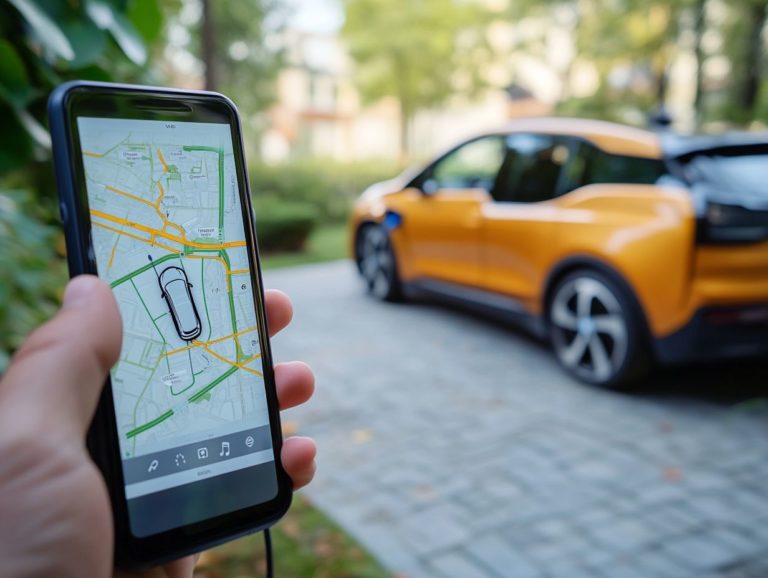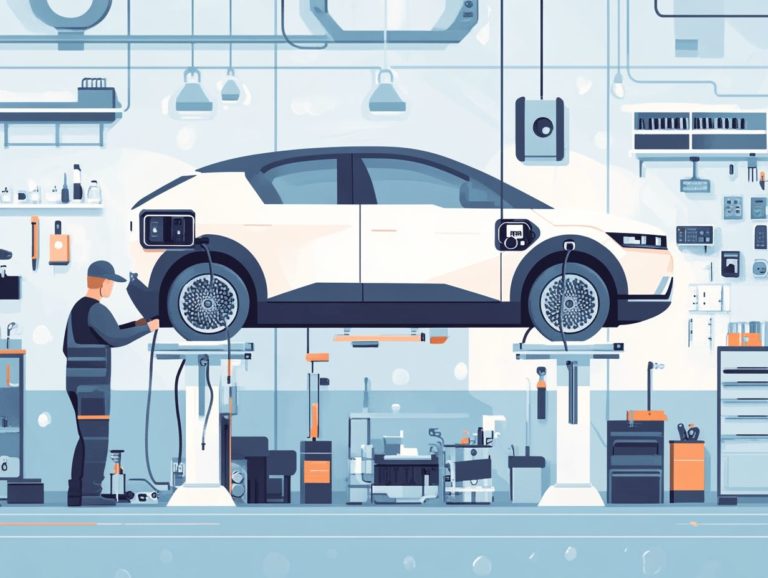How Long Do Electric Vehicle Batteries Last?
Electric vehicles (EVs) are revolutionizing transportation. The battery plays a pivotal role in this transformation.
As a potential EV owner, it s essential to understand the types of batteries used in EVs, the factors affecting their lifespan, and the best practices for maintaining them.
Join us as we explore the expected lifespan of EV batteries, offer tips for optimal performance, highlight signs of degradation, and underscore the importance of recycling and disposal.
Contents
- Key Takeaways:
- Overview of Electric Vehicle Batteries
- Factors Affecting Battery Lifespan
- Expected Lifespan of EV Batteries
- How to Extend the Lifespan of EV Batteries
- Signs of Battery Degradation
- Identifying and Addressing Battery Issues
- Recycling and Disposal of EV Batteries
- Environmental Impact and Proper Disposal Methods
- Frequently Asked Questions
- How long do electric vehicle batteries last?
- What affects the lifespan of electric vehicle batteries?
- Can the lifespan of an electric vehicle battery be extended?
- What happens when an electric vehicle battery reaches its end of life?
- How often do electric vehicle batteries need to be replaced?
- Are there any warranties for electric vehicle batteries?
Key Takeaways:

- EV batteries can last up to 8-10 years with proper care and maintenance.
- Extreme temperatures and aggressive driving can impact the lifespan of EV batteries.
- To extend the lifespan of EV batteries, follow industry standards, practice good driving habits, and maintain the battery properly.
Overview of Electric Vehicle Batteries
EV batteries are crucial in the evolving sustainability landscape. They power innovative vehicles like the Chevrolet Bolt and Hyundai Kona Electric, driving the shift towards cleaner transportation solutions.
These batteries primarily utilize lithium-ion batteries. They are celebrated for their efficiency and energy density, making them an excellent match for popular models such as the Nissan LEAF and Tesla Model S.
Not only do these batteries provide impressive range, but they also feature quick charging times, significantly boosting the appeal of EVs. It’s important to explore the subtleties of various battery chemistries. Alternatives like solid-state and lithium iron phosphate batteries are gaining traction, offering distinct advantages.
For instance, solid-state batteries promise enhanced safety and greater energy capacity, while lithium iron phosphate is known for its longevity and thermal stability. Innovations in battery technology continue to drive down costs, extend lifespan, and improve performance, setting the stage for a thrilling future in sustainable transportation.
Factors Affecting Battery Lifespan
The lifespan of batteries in electric vehicles is influenced by several factors. Environmental conditions, driving habits, and charging practices all play crucial roles in how your battery ages over time.
Being mindful of these elements is essential for maximizing your vehicle’s performance and longevity.
Environmental Conditions
Environmental conditions are critical for the longevity and performance of your EV batteries. Factors like temperature extremes can accelerate battery degradation.
For example, in California, the hot summers and cold winters put considerable stress on battery systems. High temperatures can speed up chemical reactions, potentially shortening its lifespan. In contrast, extreme cold can hinder the battery’s ability to hold a charge effectively. High humidity may also cause corrosion over time.
To mitigate these effects, consider adopting proactive practices such as:
- Parking in shaded areas or garages
- Utilizing thermal management systems
- Regularly monitoring battery health to ensure optimal performance
Discover more about how to care for your EV battery!
Driving Habits

Your driving habits play a crucial role in determining the lifespan of your EV battery. Quick starts and high-speed driving can lead to increased battery wear and reduced longevity.
Research shows that aggressive driving can decrease your battery’s lifespan by nearly 20% compared to those who take a more measured, eco-friendly approach. A study from the University of Michigan reveals that using eco-driving techniques like gentle acceleration and maintaining a steady speed can significantly mitigate battery degradation.
To maximize your battery health, recognize that frequent rapid charging and exposure to high temperatures can exacerbate wear over time. By adopting smoother driving styles and minimizing extreme conditions, you not only enhance your battery’s longevity but also improve overall efficiency.
Expected Lifespan of EV Batteries
The expected lifespan of EV batteries is a crucial factor for consumers. Most lithium-ion batteries are engineered to last between 8 to 15 years and often come with a manufacturer s warranty that boosts confidence in their durability.
Industry Standards and Warranty Coverage
Industry standards for EV batteries, particularly regarding manufacturers’ warranty coverage, offer significant peace of mind. These warranties ensure that batteries meet rigorous performance and safety benchmarks throughout their expected lifespan.
This type of warranty safeguards your investment and showcases manufacturers’ confidence in their products. Typically, warranties cover defects in materials and workmanship, as well as capacity loss, lasting anywhere from eight to ten years or up to 100,000 miles.
For example, Tesla offers an impressive eight-year warranty that guarantees at least 70% capacity retention. In contrast, Nissan provides a similar warranty duration but varies capacity retention guarantees based on specific models.
By understanding these differences, you can make informed choices and compare the reliability and reputation of various electric vehicle options available in the market.
How to Extend the Lifespan of EV Batteries
You can dramatically boost the lifespan of your EV batteries by embracing diligent maintenance, optimal charging practices, and a keen understanding of how to minimize battery degradation.
With a little effort, you’ll enhance the performance and longevity of your investment, ensuring that your journey remains smooth and efficient.
Tips for Optimal Battery Performance
<pTo achieve optimal battery performance in your electric vehicle, embrace best practices in battery maintenance and charging habits.
For instance, steer clear of fast charging whenever possible. While convenient, frequent use can create excessive heat buildup, diminishing your battery s overall lifespan. Also, keep your battery within a moderate temperature range to avoid unnecessary strain on the cells.
Regularly monitor your vehicle s battery health through onboard diagnostics or smartphone apps for invaluable insights. Many models provide battery health reports, alerting you when service or replacement may be necessary. By following these practices, you can significantly extend your vehicle s efficiency and lifespan.
Signs of Battery Degradation

Recognizing the signs of battery degradation is crucial for you as an EV owner. Early detection helps mitigate further damage and extends your battery’s overall lifespan.
Start implementing these tips today to keep your battery in top shape!
Identifying and Addressing Battery Issues
Identifying and addressing battery issues promptly is key to preventing further degradation and ensuring the longevity of your electric vehicle s battery.
Recognizing early signs of battery wear is crucial for maintaining optimal performance. Look for a reduced driving range or slower charging times.
Regularly monitoring the battery’s how much power is left and overall health indicator will provide you with valuable insights.
If you notice any abnormalities, conducting simple tests, such as measuring voltage or checking for swelling in the casing, can help you pinpoint potential issues.
If a problem arises, seek professional assistance immediately. By adopting proper charging habits and keeping the battery clean from dirt and debris, you can significantly enhance its durability and reliability over time.
Recycling and Disposal of EV Batteries
Knowing how to dispose of your battery properly is essential for a healthier planet! The recycling and disposal of EV batteries are critical factors in reducing environmental impact.
Environmental Impact and Proper Disposal Methods
The environmental impact of mismanaged EV batteries can be quite severe, underscoring the urgent need for proper disposal methods and effective recycling programs to minimize waste.
When batteries are carelessly discarded, harmful chemicals and heavy metals can seep into soil and waterways. This poses risks not just to ecosystems but also to human health.
It s crucial for you, as a consumer, and for manufacturers, to grasp responsible recycling practices that can help mitigate these dangers.
Many organizations, along with current regulations, are leading the charge on initiatives aimed at enhancing sustainability in battery disposal. These entities are dedicated to raising awareness and providing resources for safe recycling.
By ensuring valuable materials are recovered and reused in new batteries, we contribute to a circular economy and help lessen the environmental footprint of electric vehicles.
Frequently Asked Questions
How long do electric vehicle batteries last?

Electric vehicle batteries typically last between 8 to 10 years, but this can change based on a few key factors, including the lifespan of an EV battery.
What affects the lifespan of electric vehicle batteries?
The lifespan of electric vehicle batteries can be impacted by driving habits, weather conditions, and maintenance of the battery.
Can the lifespan of an electric vehicle battery be extended?
Yes, the lifespan of an electric vehicle battery can be extended by implementing good charging practices, avoiding extreme temperatures, and regular maintenance check-ups.
What happens when an electric vehicle battery reaches its end of life?
When an electric vehicle battery reaches its end of life, it can still be recycled and used for other purposes, such as energy storage for renewable sources or repurposed for other electric vehicles.
How often do electric vehicle batteries need to be replaced?
Electric vehicle batteries typically need to be replaced every 8 to 10 years, but this can vary depending on usage and maintenance, as outlined in our guide to understanding battery life in electric vehicles.
Are there any warranties for electric vehicle batteries?
Yes, most electric vehicle manufacturers offer warranties for their batteries, usually ranging from 8 to 10 years or a certain number of miles, whichever comes first.
Have more questions about electric vehicle batteries? Don t hesitate to ask!






